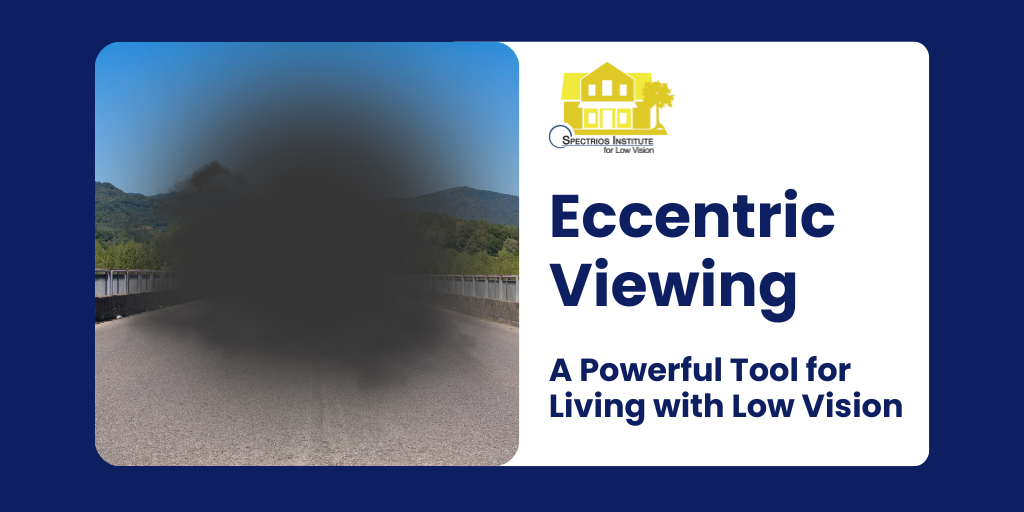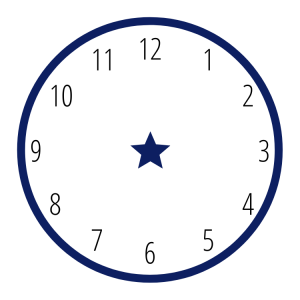
Eccentric Viewing: Powerful Tool for Living with Low Vision

Many people living with macular degeneration or other eye diseases tell us the same story: they can no longer clearly see their loved ones’ faces. One patient shared that her grandson looked like a “gray blob” while opening his birthday presents. These changes can feel overwhelming, but there are proven techniques that can help.
At Spectrios Institute for Low Vision, we teach patients how to make the most of their remaining vision. One of these methods is called eccentric viewing.
What Is Eccentric Viewing?
From a young age, we are taught to look straight at the object we want to see. Our central vision gives us sharp details and rich colors. But when diseases like age-related macular degeneration or Stargardt’s disease affect the macula, the center of vision becomes blurred, distorted, or even has a blind spot.
Eccentric viewing is a strategy where you learn to look slightly away from what you want to see. This allows you to use healthier parts of the retina, making details clearer. The area you use instead of the damaged macula is called the preferred retinal locus (PRL).
Key Facts to Remember
- Macular degeneration or Stargardt’s disease does not cause total blindness. Peripheral vision usually remains.
- A central blind spot moves with your eye.
- Peripheral vision can often compensate for some of the loss of central vision.
The Clock Dial Method

One simple way to find your best eccentric viewing position is the clock dial method. Imagine your loved one’s face is at the center of a clock. Try shifting your gaze in different directions:
- 12 o’clock – look slightly above their head.
- 3 o’clock – look slightly to the left.
- 6 o’clock – look slightly below their chin.
- 9 o’clock – look slightly to the right.
Notice when their face looks the clearest. That spot is likely your preferred retinal locus. With practice, you can train yourself to use that spot more naturally. At first, it may feel awkward, but regular practice can make it second nature.
Video: Dr. Rachel Park Explains Eccentric Viewing
Learn more about eccentric viewing by watching this short video from Dr. Rachel Park, Low Vision Optometrist at Spectrios Institute:
How Eccentric Viewing Helps
If you are living with vision loss, eccentric viewing can help you with everyday activities like:
- Recognizing faces
- Reading
- Watching TV
- Looking at photos
It gives you a way to work around central vision loss and helps you maximize the vision you still have. Many people with low vision tell us this skill makes daily life less frustrating and more enjoyable.
Professional Training Makes a Difference
Some people naturally find a way to use their peripheral vision, but often the spot they choose is not the most effective. That is where professional training helps. At Spectrios Institute for Low Vision, our specialists can:
- Assess your vision to find your best PRL.
- Teach you techniques to stabilize eccentric viewing.
- Provide tools and resources to support your independence.
This training is part of a comprehensive low vision rehabilitation exam, where we look at your full needs and create a plan tailored to you. Learn more about our low vision services here.
Additional Resources
- Living Well with Low Vision – Prevent Blindness
- Vision Rehabilitation Resources – National Eye Institute
Take the Next Step
If you or a loved one is struggling with central vision loss, there is help. Eccentric viewing is just one of the techniques that can make a big difference. Our team at Spectrios is here to guide you through the process and help you regain confidence in daily activities.
Call us today at 630-690-7115 or contact us online. Let us help you see the world in a new way.
Spectrios Institute for Low Vision is a national leader in low vision rehabilitation. We are a not-for-profit dedicated to helping individuals with low vision lead full, independent lives despite vision loss.